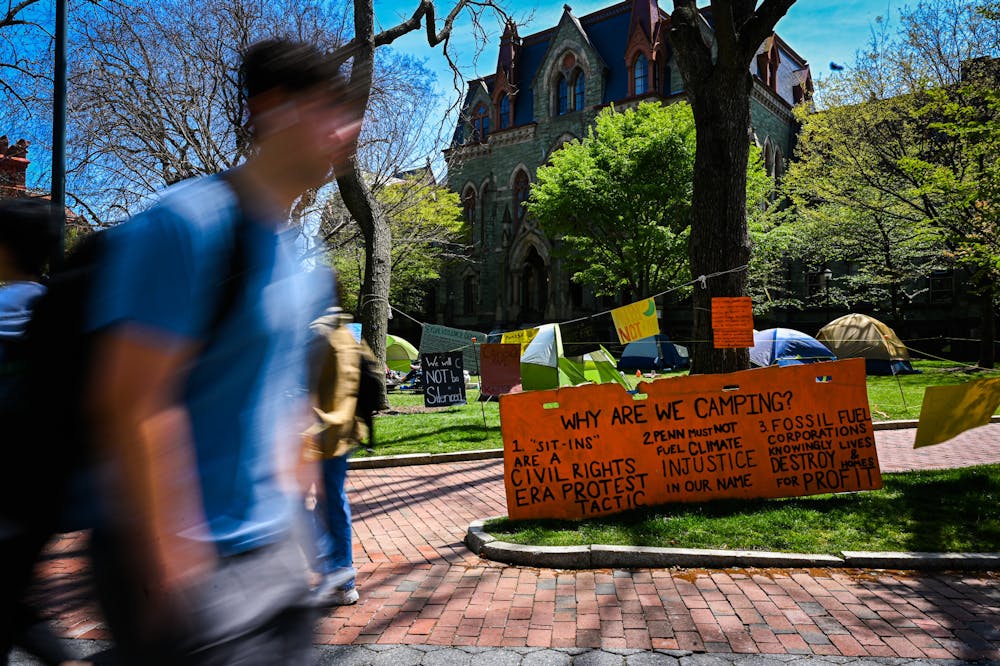
Fossil Free Penn led a six-day-long encampment on College Green in April 2022, demanding that the University divest and support climate justice organizations on campus and beyond.
Credit: Kylie CooperDivestment activists filed a legal complaint with Pennsylvania Attorney General Michelle Henry on Monday, arguing that Penn's Board of Trustees is violating state law by investing in the fossil fuel industry.
The complaint, written by Fossil Free Penn and obtained by The Daily Pennsylvanian, argues that the Board of Trustees violated its fiduciary duties outlined in state law by investing a portion of Penn’s $21 billion endowment in the fossil fuel industry. It calls on the attorney general's office to investigate the Board of Trustees' conduct and order them to end all direct and indirect investments in fossil fuels.
“The privileges that Penn enjoys as a nonprofit institution come with the responsibility to ensure that its resources are put to socially beneficial ends," the complaint, which will be filed in Harrisburg today, reads. "By investing millions in fossil fuel stocks, Penn has violated these duties to the public."
Student groups at five other universities — including the University of Chicago, Washington University in St. Louis, Tufts University, Pomona College, and Pennsylvania State University — will also file complaints to their state’s attorneys general today. Over 150 Penn faculty, alumni, student groups, Philadelphia organizations, and national and international organizations signed the complaint against Penn's Board of Trustees.
“Hopefully, this divestment complaint will open up an avenue of discourse that allows Penn to be not only at par with their peers, but exceed them,” College sophomore and FFP coordinator Eliana Atienza said, citing the resources Penn has to "be a climate leader."
In response to a request for comment, a Penn spokesperson pointed the DP to a statement made last November where Penn said that it no longer holds any direct investments in fossil fuel companies or the 200 companies whose reserves contain the largest amount of potential carbon emissions.
"We must move away from fossil fuels, but we can only do so completely once we can produce abundant, affordable, and secure energy from carbon-free sources," Penn President Liz Magill and Board of Trustees Chair Scott Bok wrote last year.
In November 2021, the University pledged to achieve net-zero greenhouse gas emissions.
"The Trustees have thoughtfully reviewed requests to divest from fossil fuels," the spokesperson wrote to the DP.
The attorney general's office declined to comment.
The 67-page complaint — written with guidance from pro bono lawyers from the Climate Defense Project — argues that the Trustees’ continued investment in fossil fuels violates the fiduciary duties outlined in the Pennsylvania Decedents, Estates and Fiduciaries Code and Nonprofit Law, or Title 20.
Under Title 20, the Board of Trustees has a fiduciary responsibility to invest with consideration of the University’s "charitable purposes.” This duty distinguishes nonprofit institutions from other investors.
The complaint says that addressing "the harms that are created by climate change" is part of Penn's charitable mission because the University is engaged in work to address the climate crisis. For example, Penn has demonstrated that it understands its responsibility to play a role in addressing the climate crisis through initiatives like the Climate and Sustainability Action Plan.
However, “the Trustees have repeatedly refused to apply Penn’s values to its investment activity," according to the complaint.
'By investing in fossil fuels, they’re directly contravening their charitable purposes, in a way that's particularly pronounced for these organizations might not be the case for other nonprofits that are not so focused or don't talk so publicly about dealing with climate change," Ted Hamilton, a staff attorney at the Climate Defense Project, said.
The complaint also accused the Board of Trustees of neglecting its legal duty to manage Penn’s assets with prudence, since long-term ownership of fossil fuel assets is becoming increasingly risky.
The complaint does not state the exact amount that the University has invested in fossil fuels, but it estimates that the amount is similar to the level of investment among other Ivy League universities.
Before divesting in 2021, Harvard held $394 million in direct funds and $838 million total, while Princeton held $13 million in direct funds and $1.7 billion in indirect funds before their divestment in 2022, according to the complaint.
FFP members worked on writing and drafting the complaint starting last spring. The general outline of the complaint came from the CDP, which has previously worked with student activist groups on university campuses to create school-specific legal strategies for climate goals based on state laws that delineate the conduct of charities or nonprofit investors.
Similar complaints have been filed by student groups at other universities, including Climate Justice Cornell, activists with Fossil Fuel Divest Harvard, and students at the Massachusetts Institute of Technology, Princeton University, Stanford University, Vanderbilt University, and Yale University. The latter complaint argued that university investments in fossil fuels do not act in accordance with their charitable purposes as tax-exempt educational nonprofits outlined in the Uniform Prudent Management of Institutional Funds Act. Pennsylvania is the only state that has not adopted UPMIFA.
College junior and FFP member Eug Xu said that FFP decided to take this legal approach following its previous activism, after which Penn administration asked FFP to pursue its goals through legal means.
“Now we are quite literally pursuing the most legal route that one can take towards fossil fuel divestment, which is filing a legal claim," Xu said.
Still, Hamilton said that this approach to divestment is a relatively new legal strategy. The provisions about investing within the bounds of charitable purposes have not been commonly used, Hamilton said, citing conversations with attorneys general.
In the long term, Hamilton said he hopes a legal consensus will emerge that the law mandates against investments in fossil fuels. In the short term, he said that this legal strategy has applied pressure to schools that has sometimes led them to divest.
College senior and FFP coordinator Katie Francis said the organization will pursue a "long series of tactics" with the "ultimate goal" of getting Penn to divest fully.
It is now the attorney general's responsibility to determine whether Penn has violated the law. If such a determination is made, it would set a precedent for universities and nonprofits that they cannot promote activities that harm the climate, Hamilton said.
FFP will host a press conference and rally about the complaint on Monday, Oct. 30, at 1:30 p.m. on College Green.
The Daily Pennsylvanian is an independent, student-run newspaper. Please consider making a donation to support the coverage that shapes the University. Your generosity ensures a future of strong journalism at Penn.
Donate







